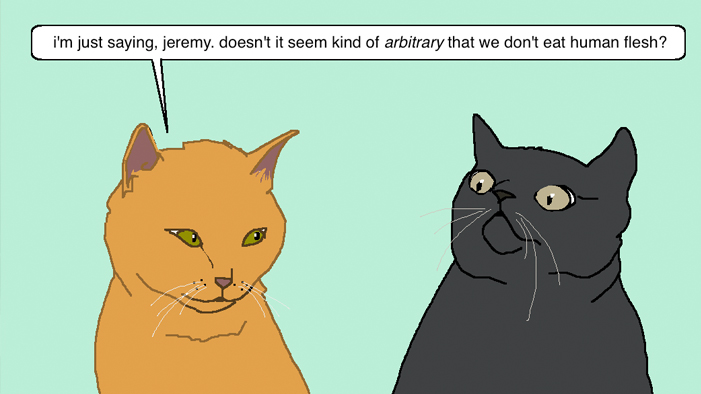Auntie SparkNotes: Should I Be a Vegetarian?

Dear Auntie,
I have a friend who is vegetarian, but she doesn’t mind when anyone else eats meat. She’s a pretty good person, but there was something she said that got some gears turning in my head.
I was eating a fried chicken sandwich at lunch when she asked me how I would eat a chicken but never want to eat a parrot, owl, or penguin. She wasn’t trying to accuse me of anything; she was just posing a question for me. I guess like any Westerner, I felt like the chicken was a good source of food while the latter three animals were wild animals, and I probably wouldn’t eat the latter three unless I was out starving in the wilderness. That’s what made me realize that my preferences were entirely based on arbitrary emotional and cultural connections to specific animals.
There are also places in the world where, say, my dog would be considered a meal rather than a pet. Is that any different from the way I consider a pig a meal and not a pet? (Although I’ve seen plenty of cute pig videos to know that they could make good pets.) There are also places in the world where a cow is considered a sacred animal instead of a meal, but that standard is placed in a religious context that (some would argue) has a more objective meaning behind it than “look at this cute doggo gif, I could never kill and eat this animal.”
All my preferences on which animals I should and shouldn’t eat are completely arbitrary and rely on subjective emotional appeal. Does this mean that I’ve been a hypocrite this whole time, Auntie? Does this mean that I should become a vegetarian?
Nope.
Which is not to say that you shouldn’t become a vegetarian, of course! What you eat and why, to employ a favorite and tragically under-utilized expression, is no skin off my ass. But if you’re going to swear off meat, please let that be a decision you make for your own reasons, according to your own principles—and not just because your friend hit you with an absurd guilt trip over your dietary choices dressed up in the guise of “just posing a question,” and especially not when the guilt trip is founded on such an incredibly silly argument. Why would you eat a chicken, but not a parrot? I don’t know, dude; why do you wear boots made of suede or leather, but not the skin of a cat? Why would you eat cheese made from goat’s or cow’s milk, but not the milk from a human breast? I mean, the taboos surrounding cat leather or human boob cheese are just as arbitrary as the ones surrounding fried parrot sandwiches, but there are also really concrete and logical reasons behind the preference for certain animals and animal products as a source of food. As you said, you probably would eat a wild animal if you were desperate and it was the only thing available—but because you’re not desperate, and because chickens are easy and cost-effective to keep as farm animals and yield much more (and more palatable) meat than a parrot, they’re what’s in your sandwich. And sure, that’s partly a cultural thing, but it’s also a circle-of-life thing. Chickens are natural prey; even other birds, including hawks and owls, will eat one if they have the chance.
To be clear, none of this is to say that there aren’t good and compelling reasons to avoid meat, or eat less of it. Human consciousness does give us the unique capacity to feel like hypocrites when we choose to eat some animals but not others, or to feel guilty for eating meat at all, and that’s something we all have to reckon with. In your case, since you’re so troubled by the realization that your eating habits are at least partially influenced by geographic and cultural factors, I’d suggest reading up on the global history of animal husbandry to get a better understanding of how and why certain animals came to be domesticated for slaughter, while others were used for transportation or companionship. You might also want to investigate the history of culinary taboos—including the religious edicts against eating beef, pork, or shellfish—to better understand how practical concerns over health, cleanliness, and scarcity of resources often ended up being codified into moral/spiritual law. And if you’re not sure how you feel about the ethics of consuming animals, then by all means, get familiar with the various angles of that debate until you can make an informed, critical decision that’s in line with your personal principles. There’s no shortage of thoughtful, scientific, and philosophical work out there to engage with. (If you’re looking for a place to start, Temple Grandin’s work and writings are very insightful and informative, even if you don’t share her perspective on the ethics of animal slaughter.)
In other words, wrestle with this the way you’d wrestle with any complex issue. Be interested, be critical, be skeptical, and be open to revising your views depending on what you learn. And at the end, what you eat will still be nobody’s business but yours—but whatever your sandwich is made of, you can be confident that you’re eating it for reasons that make logical and moral sense to you.
Got something to say? Tell us in the comments! And to get advice from Auntie, email her at advice@sparknotes.com.
Want more info about how this column works? Check out the Auntie SparkNotes FAQ.












